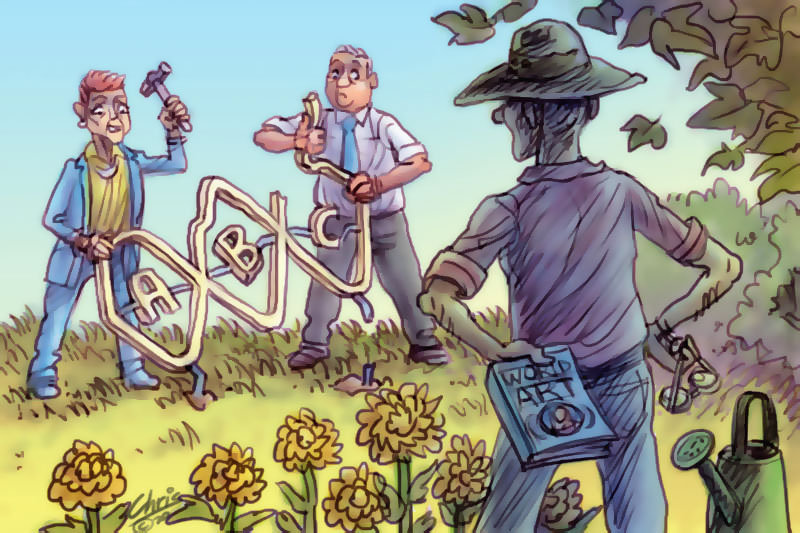Extract from Eureka Street
- Brian Matthews
- 04 August 2020
Our neighbor Sam is in his mid-seventies. He takes things quietly, enjoys a chat where our two gardens converge at a corner of the lambing paddock that unfolds beyond our shared wire fence and, regularly in summer, Sam is partial to a few cooling drinks. He is diabetic so he chooses his tipple very carefully and in line with such professional medical advice as he’s prepared to follow — which is not all of it. Still, he is very active, regularly mows his own considerable expanse of lawn, keeps an attractive, Australian garden and maintains a knowledgeable survey of the multitudinous bird life in our piece of the valley.

Sam did not receive much more than the mandatory slice of early education and entered the work force as an apprentice butcher. Though successful, he moved on to the more gruelling but also at that time more lucrative truck driving. Meanwhile, however, he fell in love with a Dutch girl and after their marriage they moved to Amsterdam. In ensuing years, Sam mastered the language, broadened his skills from butchering and trucks to building and meanwhile the family took shape with the addition of two sons and a daughter.
Sam was fascinated by the ambience of Amsterdam and especially the Rijksmuseum which he visited as often as his day-to-day busy life would allow. There were names he’d heard of — Rembrandt, Vermeer — and others he hadn’t come across before — Franz Hals, Jan Brueghel, Ferdinand Bol. As he recalled those times in his slightly self-deprecating, measured way, yarning about great art over our Australian post-and-plain-wire fence, Sam would often admit to having felt in those years an excitement never again matched in his interesting life.
Back in Australia eventually, Sam and his wife encountered some hard times and the marriage faltered and finally broke down, though he remained in regular, amiable contact with the Ex, as he called her, and with his by then grown up family, routinely spending Christmas with them and visiting often.
With his health deteriorating, Sam was able to return to his old job as a butcher in a supermarket chain and, with the help of his daughter, he bought a small rural cottage on about half an acre on the edge of a beautiful, kilometres-long park-like paddock dotted with hundred-year old gums — the paddock which our garden fence also backed on to, and so we met.
Sam is an unobtrusive, courteous and thoughtful neighbour. When, at the beginning of our first winter in the district, my wife and I were unloading a ute-full of wood, Sam appeared unannounced at the fence wearing thick protective gloves (‘this split red gum is full of splinters, mate’) and got to work with us, emptying and stacking. Never one to intrude, Sam took several wood stacking episodes before suggesting politely to my wife that she buy some tough gloves for wood work’ and that her shoes were like ‘bloody slippers’ and she should get proper boots before she did some damage to her feet. But it was during these convivial working bees and the occasional after work drink that we came to realise that Sam is a man with a huge range of reference.
'...People who recognize attacks on and relentless defunding of the national broadcaster, bringing it close to effective annihilation, as a bridge of philistinism at last too far, as an ‘enough is enough’ moment.'
Without formal education but with a sharp, enquiring mind and being bilingual, Sam became a voluminous reader — of biography mostly but also Australian history and war history — and, in the absence of a Rijksmuseum, maintained his interest in classical art by careful choice of TV programs (he has recently acquired his first computer and is embarking on online researches). Sam is, in short, a genuine autodidact, self-taught, massively well-read and well informed.
But perhaps the most interesting observation Sam has made about his life of the past fifteen years — living alone, from time to time in indifferent health, intent on living and not merely seeing out the years, as he puts it — is his love of and dependence on the ABC. He listens to Radio National and ABC Classic, follows news on Channel 2 and tunes in to as many as possible of the ABC’s array of special programs — on health, sport, politics, gardening, documentaries and Indigenous affairs.
The enemies, opponents and disapprovers of the ABC include among others genuine intellectual critics, politically motivated activists and implacable ABC haters. In these categories, you can pick your own team from the usual suspects: Gerard Henderson, Chris Kenny, Andrew Bolt, Tony Abbott, the present Coalition government, most of its predecessors of either political stripe, The Australian, various ‘shock jocks’, Pauline Hanson et al.
It might be salutary for all of them to consider the possibility that there are many people like our friend Sam distributed across the country; people whose affection for, reliance upon and loyalty to the ABC cuts cleanly and sharply straight through their other preferences and connections. People who recognize attacks on and relentless defunding of the national broadcaster, bringing it close to effective annihilation, as a bridge of philistinism at last too far, as an ‘enough is enough’ moment.
Sam doesn’t claim much but he could be right about this one. Let’s hope, anyway.
 Brian Matthews is honorary professor of English at Flinders University and an award winning columnist and biographer.
Brian Matthews is honorary professor of English at Flinders University and an award winning columnist and biographer.
No comments:
Post a Comment